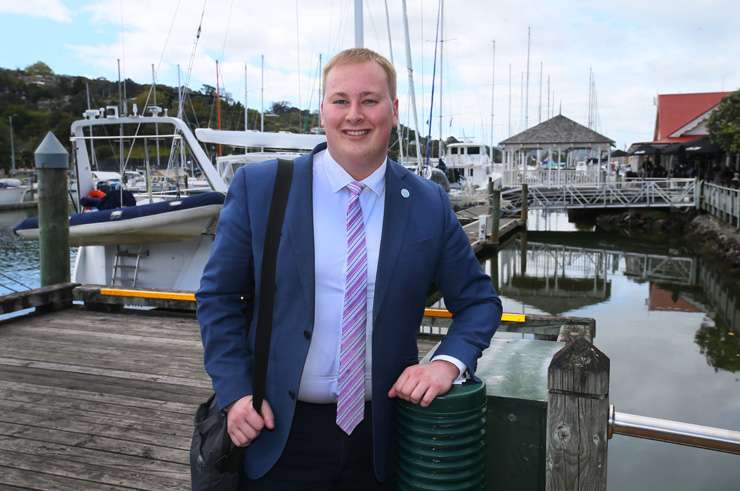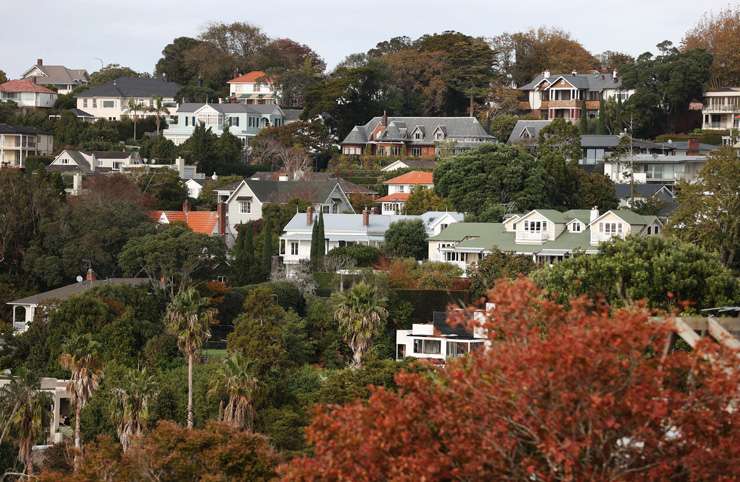The housing market went from FOMO (Fear of Missing Out) to FOOP (Fear of Overpaying), as the unexpected Covid-related boom times gave way to falling house prices, tighter credit conditions and uncertainty about the year ahead.
Figures from OneRooof and its data partner Valocity, covering the 12 months to the end of October 2022, show the extent of the market shift and highlight the real risk of negative equity for homeowners who bought at the height of the boom.
The nationwide average property value has fallen nearly $90,000 (8.15%) since hitting a high of $1.098 million at the end of February.
The housing market slump has cost homeowners in the country's capital almost $200,000, the latest OneRoof-Valocity house value report shows.
Start your property search
Property values in every region bar one - West Coast, New Zealand's cheapest housing market - have dropped over the course of 2022.
OneRoof-Valocity analysis shows some have fared much worse than others.
The average property value in Greater Wellington plunged $201,818 (17.68%) to $940,000 million since peaking in March, while Wellington City's average property value dropped $299,000 (22.5%) since market peak, with some suburbs in the capital taking a price hit of more than $400,000.
Greater Wellington has taken more of a hit than other regions because of a sudden pull-back by Auckland investors, who were largely responsible for much of the price inflation in the region post-Covid.
Auckland is the second worst affected region, with its average property value down more than $180,000 (12%) since market peak. Property values in Hawke's Bay have also been severely challenged by the slump, dropping $102,000 (10%).
A comparison of sale prices during the height of the boom and now suggests negative equity will take a heavy toll on new homeowners in Greater Wellington and Auckland if mortgage repayments become unmanageable as a result of rising interest rates.
In the three months to the end of September 2021, the median price paid by first- home buyers in Greater Wellington was $845,000, while the median purchase price for first- home buyers in the three months to the end of September this year was $740,000 - a drop of $104,000 $105,000 (12.4%). And in Auckland, the median purchase price for first- home buyers dropped $128,000 (12%) over the two periods. Homeowners in both regions who bought in the closing months of last year could expect to take similar hits if they were forced to sell now.
James Wilson, head of valuations at Valocity, says: "Property values have slid back to 2021 levels in most regions, with the slump knocking Auckland back to levels last seen in August 2021 and Greater Wellington to April 2021. Canterbury bucked the national trend, with the first half of 2022 still a period growth, although now values in the region are starting to drop.
"The value correction experienced in 2022 is the largest since 2010, but has to be seen in context. The property boom post-Covid is one of the strongest New Zealand has experienced; between January 2020 and early 2022 the nationwide average property value grew by 33%. But while sale prices have grown at a substantial rate the number of transactions has not, with quarterly sales volumes in 2022 now below pre-Covid levels."
Wilson says the drop-off in sales activity is also reflected in the mortgage registration figures. While the share of new mortgage registrations by first- home buyers and investors has bounced back from lows seen in the first quarter of last year (for first- home buyers and the third quarter of 2020 (for investors), the actual number of registrations by each buyer group has dropped to pre-Covid levels."
Wilson says that while negative equity is a concern, strong employment numbers mean the housing market is unlikely to see a surge in mortgagee sales or a house price crash. "A key indicator of market peril would be an exodus of one or several buyer groups nationwide. Sales volumes are down but investors haven't withdrawn en masse. Mortgagee sales peaked at the end of 2009, just after the GFC, and have been in decline since 2012, and currently make-up just 0.1% of sales.

Valocity head of valuations James Wilson: "The value correction experienced in 2022 is the largest since 2010, but has to be seen in context." Photo / Fiona Goodall
"Negative equity for some buyers may cause worry, though. The data shows that the homeowners who purchased in late 2021 and early 2022 are more likely to be in negative equity position now. Investors, those with more than two properties are likely to be less exposed as a result of the 40% deposit requirements for investment properties."
According to the data, only 3.9% of homeowners who bought in the last five years and resold this year sold at a loss. Wilson says: "Sellers in the capital saw the largest median loss but resellers were more likely to experience losses in Auckland."
Unsettling times
Agents and experts spoken to by OneRoof say the last 12 months in real estate have been among the strangest they have encountered, with one saying “existential” factors influenced the market as New Zealanders grappled with events outside their control.
Economist Brad Olsen says house prices have fallen more than anyone would have expected because they had went way higher than expected during the post- Covid boom, which hit its peak in the closing months of 2021.
“Part of it really was that low interest rate environment stuck around for too long, certainly in hindsight,” says the principal economist and director at Infometrics.
It’s been challenging, “to put it mildly”, to forecast the market since Covid arrived, he says.
“I think everyone was a bit reluctant to, all of a sudden, call a turnaround [earlier this year] given we’d all been burnt at the start of Covid, given things didn’t turn around.”
The country saw debate around whether high inflation would be transitory or persistent and outbreaks of the Delta and Omicron strains clouded the picture.

Infometrics economist Brad Olsen: “I think everyone was a bit reluctant to, all of a sudden, call a turnaround given we’d all been burnt at the start of Covid.” Photo / Tania White
“You couldn’t get a full reading on how strong or not the economy might have been and so I think there was just a huge number of balls up in the air and none of us was quite sure which one was going to come down first.”
Inflation has turned out to be the highest for 32 years in a strange year which saw war in Europe and the threat of nuclear weapons being used, Olsen says.
“I remember at the start of this year specifically bringing up the conversation about Ukraine and the geopolitical outlook.
“I wasn't formally forecasting war if you will but I remember having that conversation and the risks that it posed.
“That was something we highlighted to our clients and those we spoke with earlier in the year and so to see that then come out and through that first and second quarter of the year was very unsettling.”
The fact people were talking openly about the possibility of a tactical nuclear bomb exploding in the battlefield is “insane”, Olsen says.
There has been an element of helplessness back in New Zealand. “We can't do a lot about some of these larger global issues, we are at the mercy of the rest of the world. But we also have to take responsibility for what we can here at home because the challenges coming through are quite significant hits to households and businesses.”
Empty auction rooms
Barfoot & Thompson auctioneer Campbell Dunoon, who noticed auction rooms empty out in late March, says people were rattled by world events.
“There were existential factors affecting people's decision to buy a property - I don't think it was interest rates and I don't think it was the local economy, because we've all got jobs and we've got a shortage of people for jobs.
“But what I do believe is there were just so many things happening outside of New Zealand that caused ourselves and our cousins across the ditch to stop for a second and say ‘OK, do we need to go into debt right now, should we just hold off and see what happens?’.”
The absence of people at auction rooms continued through the winter then started to pick up, he says.
Bayleys national auction manager Connor Patton says Auckland was the first to notice the slowdown in auction rooms but other parts of the country, such as Canterbury, Queenstown, Marlborough and Blenheim, were still going strong into the middle of the year.
Patton thinks Auckland was faster to fall because the numbers are bigger: “If you buy a $2.5m house in Auckland, which we sell every week, you might have a mortgage of circa $2m, which in terms of interest rate rises and the effect of that is much different to Christchurch, where your average sales price is $800,000 to $1m and you've got a mortgage of $600,000.”

An auctioneer fields bids during a Wellington auction at the end of 2020. The auction action this year has been more muted. Photo / Getty Images
By September, the market was starting to pick up in Auckland but the pace was still slower than the boom times.
“Last year, I can remember scenes where we literally had two different buyers on the phone and both of them just had their arms up and wouldn't take them down - as quick as I could count, that was how fast the bidding was going up.”
The frenzied pace slowed in conjunction with changes to the CCCFA, which affected people’s ability to get finance: “It wasn't just the affordability of money but in hindsight the relative ease of it,” Patton says.
Faster and higher
Sanjeev Jangra, a Loan Market mortgage adviser who works in Auckland’s south, says interest rate hikes took people by surprise, especially last year's borrowers who were not expecting them to go so high so fast.
Prices have come down but so has affordability meaning people who bought a $1m house last year with a 10% deposit will have to find another $1500 to $2000 if their loan comes up for renewal this year.
One of the big changes Jangra has noticed this year is a switch in his client base from 40 or 50% investors to around 80% first-home buyers.
Investors have hit problems, he says, because with property values down 15 or 20% they don’t have enough equity.
“Generally, an investor will borrow almost 100% of an investment property but given the value of their own property has dropped quite a bit there's not enough equity and so they're just probably sitting on the sidelines.”
Jangra recalls panic buying in October and November last year ahead of the CCCFA changes on December 1 but says after that every third or fourth loan was declined by the banks.
He has still had a busy year, saying there have been a lot of first-home buyers around, including around 165,000 migrants getting residency. “A lot of them have been saving for deposits for their first home and they are pretty active.”
Steve Koerber, who works the wealthy Remuera market for Ray White, has seen a year of little urgency from buyers.
He says some buyers expected to see desperate sellers and were waiting to swoop but very few people have appeared to be in financial trouble.

The view of Auckland's Remuera, where several houses in 2022 sold for more than $10m. Photo / Fiona Goodall
Prior to November last year the market was “frothy” with some big prices being paid as buyers threw caution to the wind.
In hindsight, people were paying too much: “It was a bit reckless really, and that all came to an end pretty much around last November.”
Koerber also says higher interest rates and the CCCFA changes slowed the market with the market here slowing much faster than across the Tasman: “Our lending rules changed and Australia’s didn't.”
He also says fear in the market stopped people from listing their properties.
“Fear that they won't get what they would have got, that they are not as wealthy (on paper) as they were. They know the house is not worth as much as it was last year and it does make them procrastinate.”
Koerber says the year has been a good learning experience. “In the past when it was a hot market and people were climbing all over each other, we needed to focus on the top two or three people. Now, we have to dig deeper and go to the top 20 because the top 19 might drop off.”
‘It will get better’
In Wellington, Nicki Cruickshank, the principal of Tommy’s, says “turbulent” is the best descriptor for the year.
She, too, says prices went higher than expected last year so the drop this year was to be expected - but she had not expected the turnaround to be so sudden.
“But in the big picture most people own houses for 10 years-plus so overall they've still done well.”
Her high point has been seeing more first-home buyers returning to the market after a pretty dire start to the year, saying they dropped out for various reasons but especially because of the CCCFA changes.
By September, she was seeing a lot more people looking who were no longer waiting for the bottom of the market.
Cruickshank says her low point was trying to keep nervous sellers positive when there were so few buyers.
“Probably the hardest part of these sorts of market is trying to keep owners’ spirits up, telling them it will get better.”
She says the year has been the most unusual she can remember in nearly 20 years of being in real estate, aside from the GFC.
“Just to watch it go up so quickly, unbelievably quickly, people paying what seemed like ridiculous money for properties, to it going down equally quickly and the impact that's had.”










